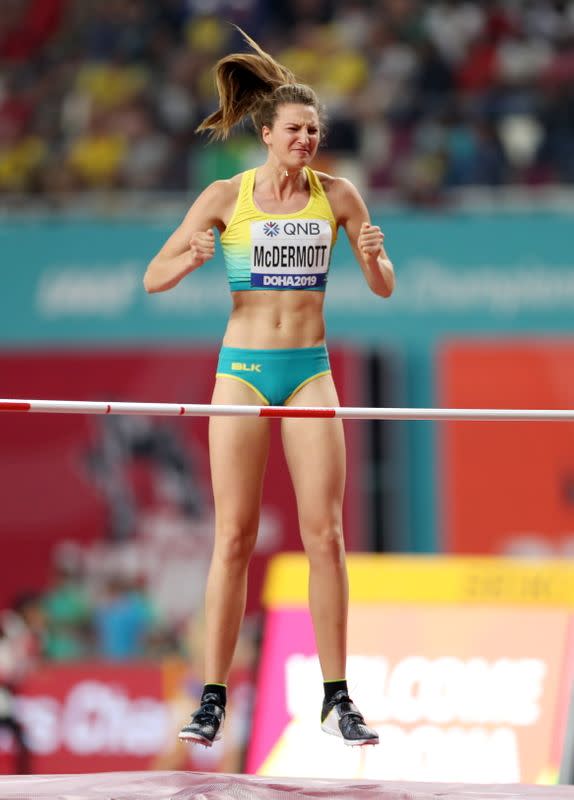Australian athletes coming on in leaps and bounds before Tokyo
By Ian Ransom
MELBOURNE (Reuters) - Australia's success in Olympic track and field quite literally slowed to a walk at the Rio Games but hopes are high for a rebound at Tokyo with a raft of elite women leading the charge.
Australia's athletics championships wrapped up in Sydney this week with a slew of Olympic qualifying marks capping an encouraging domestic season for home-based athletes.
Among the standout performers was high jumper Nicola McDermott, who cleared 2.00 metres to eclipse her team mate Eleanor Patterson's national record (1.99m) in an event won at Rio with a leap of 1.97m.
Middle distance runner Linden Hall became the first Australian woman to break the four-minute mark in the 1,500m in Melbourne earlier this month, grabbing the year-best time of 3 minutes and 59.67 seconds.
Other Australian medal threats include javelin world champion Kelsey-Lee Barber and pole vaulter Nina Kennedy, who claimed the national record of 4.82m in Sydney last month.
The performances have given Australian athletics confidence there will be an improvement on the modest return at Rio, where the team managed only a pair of men's walking medals, the 50km silver for Jared Tallent and 20km bronze for Dane Bird-Smith.
"We don't put a specific figure on our goals but we do have a number of athletes who are medal-capable," Athletics Australia's high performance chief Andrew Faichney told Reuters.
"On the women’s side we’ve just got a really strong group of athletes. We’ve pretty much got every single track event qualified for the women and many of the field events.
"We’ll still have a reasonably strong men’s programme but the women have been remarkable."
NEW HEROES
Australia will be looking for new heroes in the wake of the retirements of former Olympic hurdles champion Sally Pearson and Tallent, who helped slow the country's waning athletics returns after the 2008 Beijing Games.
Pearson, who claimed 100m hurdles gold at London and silver at Beijing, hung up her spikes in 2019 after losing her battle to injury, while Tallent last month bowed out as Australia's most successful Olympic male track athlete with four medals across three Games.
Compared to Australia's 59-strong athletics team at Rio, Faichney expects up to 70 qualified for Tokyo, no mean feat given the disruptions caused by the COVID-19 pandemic.
Australia's closed borders and travel restrictions meant many athletes eschewed the logistical challenge of competing abroad.
But the country's relative success in containing COVID-19 has been a blessing for domestic-based athletes, who have been able to train and travel freely even as overseas rivals continue to battle lockdowns.
Athletics Australia will put on further meetings in Queensland state in June to give more athletes the chance to post Olympic qualifying marks, including those who will miss running at the world relay championships in Poland next week.
"If you look at the domestic season, the athletes and coaches have used the last 12 months well to prepare themselves and I think that was the basis of such strong national championships," said Faichney.
"I think for us to have comparative freedom here has actually done us really well in performance."
(Reporting by Ian Ransom; Editing by Peter Rutherford)



